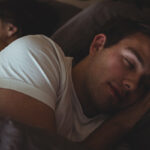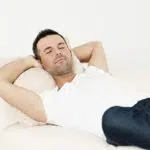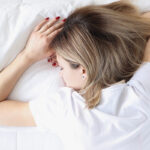Why Do I Drool When I Sleep? Causes, Remedies, and More
Drooling when you sleep can be embarrassing, especially if you don’t know that you’re doing it. If you’ve ever woken to a damp or even saturated pillow case you may have been alarmed or even concerned. While there’s no major cause for concern, drooling while you sleep is usually a sign that something else is going on.
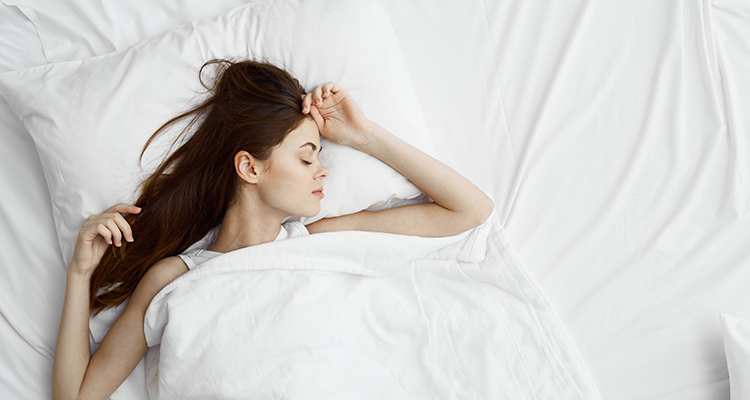
Keep reading to uncover the answer to the question, “Why do I drool when I sleep?”, including causes and remedies.
Content
Is Drooling While I Sleep Normal?
The short answer is yes. Drool is simply saliva that escapes your mouth during sleep and it’s a pretty common, normal occurrence. Saliva plays an important role in keeping your mouth and body healthy. It not only keeps your mouth and throat clean and lubricated, but it also neutralizes harmful acids and bacteria that could cause tooth decay and other oral complications.
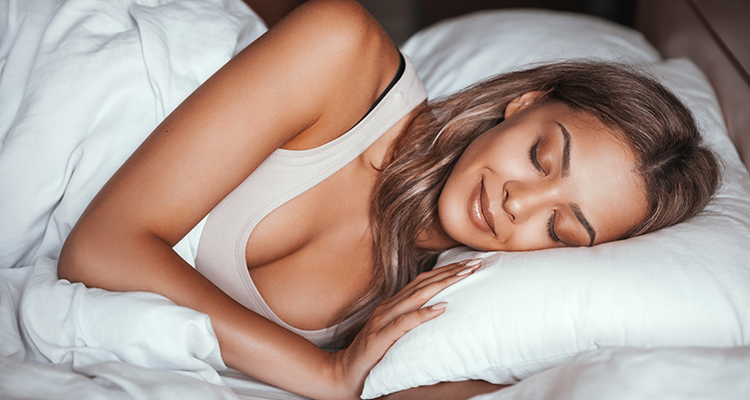
A person’s saliva production changes throughout the day, with some scientists believing it has something to do with your body’s circadian rhythm. Studies show that even though people produce more saliva during the day than at night, production doesn’t stop just because you’re asleep. While drooling isn’t particularly harmful, it can cause some unwanted side effects like bad breath, dry or chapped lips, dehydration, and embarrassment for those sharing their bed.
Waking up to a damp spot on your pillow may also be an indication of excess saliva production, a condition known as hypersalivation or sialorrhea. It can also be a sign that your body isn’t clearing saliva from your mouth effectively.
Why Do I Drool When I Sleep?
Many people think drooling is the result of sleeping with your mouth open. While this is something true, a lot more goes into it than that. Here are some of the most common reasons a person might drool while sleeping.
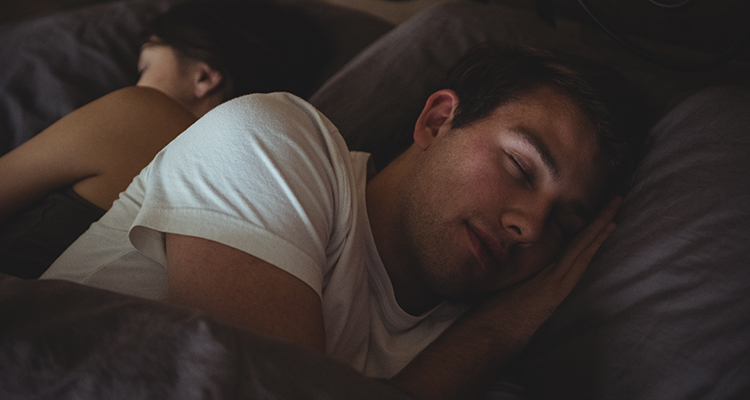
Dry Mouth or Open Mouth
Saliva’s main purpose is to lubricate your mouth. Therefore, if your mouth is dry, you’re dehydrated, or you sleep with your mouth open, glands inside your mouth will work to create more saliva. This can lead to drooling, especially if your mouth is open. This usually happens when the muscles in your body (including your face) relax during sleep, especially during your REM cycle. When this happens, your jaw falls slack and your mouth falls open.
Sleeping Position
This is one of the most common causes of drooling while you sleep. Saliva is more likely to leak from your mouth (open or not) when you’re sleeping on your side. Back sleepers have the help of gravity to keep excess saliva in their mouths and traveling down the throat. For both side and stomach sleepers, gravity is pulling the saliva from your mouth, causing you to drool as excess saliva collects on your pillow.
Bruxism
Bruxism, also known as teeth grinding, is often accompanied by drooling. One reason is that teeth grinding often causes people to breathe through their mouths, instead of their noses. Mouth breathers sleep with their mouths partially open, allowing saliva to escape. People with Bruxism are also at increased risk of snoring, having restless sleep or shorter sleep times, and may be stomach sleepers.
Gastro Reflux Disease
With over 60 million Americans suffering from heartburn every day, gastro reflux is a common nuisance. Heartburn is a mild form of acid reflux that causes stomach acids to back up the esophagus usually following a large meal or when lying down. Gastro reflux disease (GERD) is a slightly more serious condition where this backflow of stomach acid occurs constantly, causing damage to the esophagus, stomach, throat, mouth, and teeth.
GERD can also make it difficult to swallow. Some people report feeling like there’s a lump in their throat which causes excess drooling. In addition, if your esophagus is obstructed or irritated, your body may naturally produce more saliva in an effort to soothe this discomfort, causing you to drool when you sleep.
Allergies or Infections
Certain infections or allergies that cause nasal congestion can also cause drooling. Seasonal allergies, strep throat, or even the common cold can cause inflammation in your sinuses and block your airways. When this happens, you naturally breathe through your mouth and drool more. If your sinuses or nasal passage are blocked, unwanted drainage may occur from the roof of your mouth in the form of drooling. Other common infections that may increase drooling are tonsillitis, sinus infections, and mononucleosis.
Obstructive Sleep Apnea
Obstructive Sleep Apnea (OSA) is one of the more serious sleep disorders and while it can cause a variety of dangerous side effects, it can also cause you to drool when you sleep. OSA causes temporary pauses in breathing while you sleep. Many people with OSA also suffer from mouth breathing, which lets more saliva escape your open mouth. Other common signs of sleep apnea include snoring, gasping for air, choking, waking up frequently during the night, difficulty focusing during the day, and headaches in the morning.
Medication Side Effects
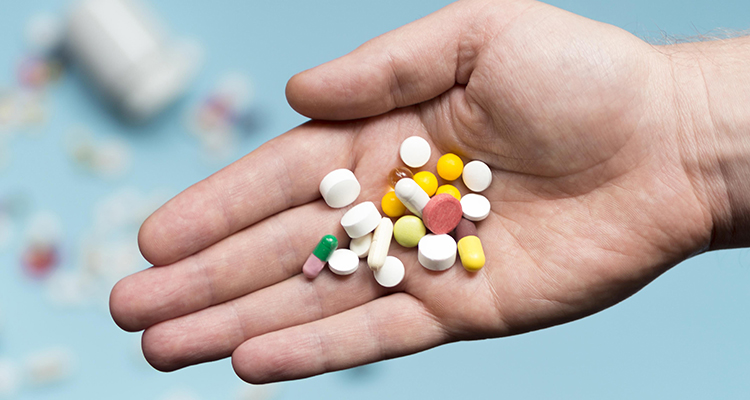
Medications have all types of side effects, including excessive salivation. The more saliva your mouth produces, the more likely you are to drool. Some common medications that cause increased saliva production include antipsychotic drugs, antibiotics, and certain medications used to treat Alzheimer’s Disease. If you recently started taking a new medication and also noticed excessive drooling, these two events may be linked. One way to find out is to check the list of potential side effects for the specific medication you’re taking. Even if drooling is a potential side effect speak to your doctor before discontinuing the use of any prescribed medications, as this can have adverse side effects.
Underlying Health Concerns
Drooling may also be a sign of a more serious underlying health condition. Your salivary glands are actually stimulated by your body’s central nervous system. This is one reason why excessive drooling and impaired swallowing are common in those with neurodegenerative disorders like Parkinson’s Disease, Alzheimer’s Disease, and cerebral palsy. As many as 80% of people diagnosed with one of these conditions also experience excess salivation. Other medical conditions that cause drooling include ALS, Huntington’s Disease, traumatic brain injury, and stroke.
It’s important to note that dysphagia, or difficulty swallowing, could also be a sign of a much more serious medication condition. Drooling is sometimes a precursor for MS, muscular dystrophy, and some forms of cancer. If you’re experiencing excess salivation alongside other concerning symptoms, you may want to speak to a medical professional.
Tips to Stop Drooling in Your Sleep
Now that you know some of the main causes of drooling while you sleep, let’s discuss potential remedies. From at-home treatments to medications and lifestyle changes, these tips can help reduce salivation production and stop embarrassing drooling.
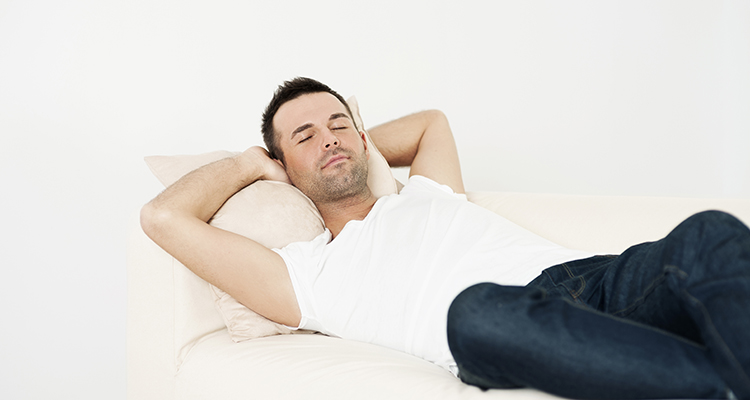
Adjust Your Sleep Position
Start by adjusting your sleep position. Side and stomach sleepers are often at greater risk of drooling since gravity is working against them. Try sleeping on your back, if you can. This will keep any excess saliva in your mouth and help it flow down your throat instead of onto your pillow. It may take some time for you to adjust to your new sleep position, especially if you’re accustomed to sleeping on your side or stomach, but be patient.
You can invest in a different pillow or place pillows along the side of your body to stop yourself from turning over. Back sleepers sometimes have difficulty breathing or experience nasal congestion and acid reflux. Pay close attention to your symptoms and how changing your sleep position affects your salivation production so you can get to the main cause of your issue.
Diagnose and Treat Allergies
If allergies are causing your drooling, treating these is a good place to start. Start by determining what type of allergies you have. Seasonal allergies to things like pollen and mold are the most common. Allergy medication, both OTC and prescription can help clear your sinuses and nasal passages, allowing you to freely breathe through your nose. This prevents mouth breathing and, as a result, drooling. Common allergy medications include Claritin, Zyrtec, and Allegra.
Wear a Mandibular Device or CPAP
There are actually devices you can wear at night to help reduce drooling, depending on your condition and the cause. A mandibular device is commonly prescribed for people suffering from Bruxism (teeth grinding). This appliance is worn in your mouth while sleeping and is designed to reduce drooling by keeping your tongue and teeth aligned and your mouth closed.
If OSA is your issue, a CPAP (continuous positive airway pressure) machine is often prescribed. While the main purpose of a CPAP machine is to increase airflow and breathing, it can also reduce or even stop drooling in those with sleep apnea.
Consider Botox
Botox injections aren’t just for vanity. They may actually help prevent or reduce drooling. While this may seem like an aggressive remedy, if you’re already interested in Botox or unopposed to the idea, this could be a viable option for treating hypersalivation. Treatment involves injecting Botox directly into the salivary glands around your mouth. This prevents these glands from overproducing saliva. Keep in mind, though, that the effects of Botox will wear off. Once your glands become fully functional again, you’ll need additional injections.
Try Speech Therapy
If your drooling is caused by issues with your jaw, tongue, or mouth, a speech therapist can teach you exercises that strengthen these muscles and improve stability. In time, you’ll learn to swallow better and more easily and breathe with your mouth closed to reduce drooling.
Research Surgery Options
Another seemingly intense remedy for drooling while you sleep is surgery. Depending on the seriousness of your condition and how desperate you are to fix it, surgery is an option for those with severe hypersalivation. Surgeries include removing your salivary glands, altering your salivary gland ducts, and reducing the number of nerve connections in the salivary glands. In most cases, surgery is reserved for people who drool during the day as well as at night. Even though surgery is often the last resort, as many as 90% of patients who have it done see an immediate improvement in saliva production.
Explore Medication Options
While some medications may cause or increase drooling, others can help prevent it. Certain people facing neurological conditions that cause hypersalivation may be prescribed something to stop it. Most preventative medications work to block the nerve impulses to the salivary glands. Keep in mind, though, that these medications aren’t without their own side effects like dehydration and dry mouth.
Try At-Home Remedies
When all else fails, or before you take drastic measures to stop drooling at night, you can try a few at-home remedies. While there’s no scientific evidence to suggest these are guaranteed to work, they may be worth a shot.
Maintaining a healthy balance of saliva in your mouth is step one. While you want to reduce saliva production to stop drooling, you can’t eliminate it completely or else you’ll face other complications like infections and compromised oral health. Biting on a lemon wedge can help you drool less without stopping saliva production completely. Some believe that citrus thins out your saliva, making it less likely to pool on your pillow. Staying hydrated is another good tip for thinning out saliva and preventing dry mouth.
Signs Drooling When You Sleep is a Cause for Concern
Drooling when you sleep is mostly just embarrassing, however, in some cases, it could be a sign that something more serious is going on. Determining the cause of your drooling is the first step. If you suffer from seasonal allergies, sleep on your side, or breathe through your mouth, you may drool more often than not. Making minor lifestyle changes or taking certain medications can help rectify the problem. If you suspect your drooling is caused by sleep apnea or Bruxism, you should see a sleep specialist and consider using a CPAP or mandibular device for both comfort and safety.
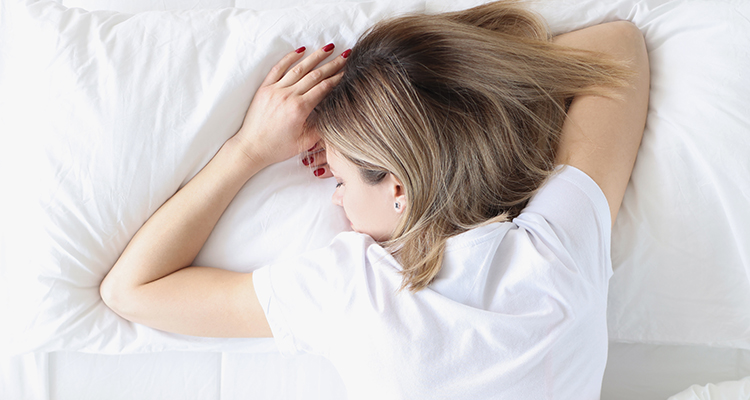
If despite your best efforts, you’re still excessively drooling and feel concerned something’s not right, make an appointment with your doctor. After asking a few questions about your sleep habits, lifestyle, and health history, a doctor can determine the root cause of your drooling and recommend the best course of action.
Is drooling in your sleep keeping you up at night? Lack of sleep can cause a slew of additional health concerns that could complicate things even further. Click here to learn more about CBT-i and how it works to improve your sleep and quality of life.


